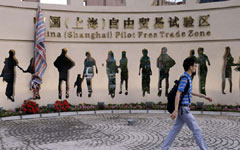Reforms at Shanghai FTZ push financial opening
Updated: 2014-03-26 16:19
(Xinhua)
|
|||||||||||
Commercial banks such as Bank of Communications and China Merchants Bank have helped companies secure off-shore yuan-denominated loans, helping companies access cheaper funding from overseas. A number of Chinese and foreign banks have begun to offer treasury solutions for multinationals. Among them, Shanghai Pudong Development Bank is helping companies shift their yuan funds between onshore and offshore entities without having to seek approval from regulators, improving capital efficiency and hedging foreign exchange exposure.
To broaden the channels for the cross-border yuan use, the central bank approved several third party payment companies. Cross border flow of the currency reached 10 billion yuan in January this year, up 54 percent from a year ago. The volume dropped slightly to just under 10 billion in February on the effect of the Chinese New Year but is still more than 50 percent up from a year ago.
 |
 |
At a forum in Shanghai this week, municipal officials declared their intent to shorten the list of prohibited FTZ activities by 40 percent this year. Zhou Zhenhua, director of the Shanghai municipal development research center, said the shortened list will remove restrictions over the service sector. "The bar to enter the service sector is usually higher than that set for manufacturing, so the refreshed list should focus on opening up services," he said.
The new list is also expected to be more clear on which areas remain off limits for foreign investors.
Zhou also added that the FTZ will introduce assessments for regulatory performance in areas such as coordination, oversight and effectiveness.
"It is commonly accepted international practice to subject regulatory bodies to assessment by independent agencies. This should also be a feature of the Shanghai zone," Zhou said.
Despite the progress the zone has made, authorities still caution against risks. "Some domestic media have called for discretion in implementing reforms. There are still risks lurking around," Zhou said.
"We have to make sure we can curb the risks that come with each step to achieving greater financial openness while fully implementing the reform package." Dai said.
Related Stories
Shanghai to float oil futures contract in RMB 2014-03-12 07:22
Shanghai FTZ to roll out free trade account 2014-03-26 10:48
Shanghai FTZ 'negative list' may be cut by 40% to boost more interest 2014-03-25 07:16
Shanghai set for review of free trade zone reforms 2014-03-07 08:17
China ready for new trials after Shanghai FTZ 2014-03-07 14:10
Shanghai FTZ lifts foreign-currency deposit rates cap 2014-02-27 08:49
Today's Top News
China, France sign business deals
Hunt focuses on China satellite pics
Jet search still 'remains priority'
11 dead in lingerie factory fire
122 objects possibly from plane located
Openness urged in property disputes
Panda visit wows Obama family
Commuter plane lands after fire in Malaysia
Hot Topics
Lunar probe , China growth forecasts, Emission rules get tougher, China seen through 'colored lens', International board,
Editor's Picks

|

|

|

|

|

|





